
Timeline of Shakespeare criticism
Encyclopedia
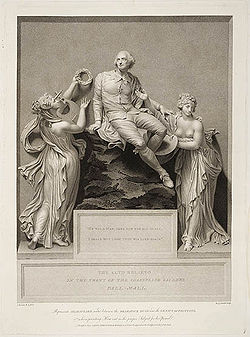
William Shakespeare
William Shakespeare was an English poet and playwright, widely regarded as the greatest writer in the English language and the world's pre-eminent dramatist. He is often called England's national poet and the "Bard of Avon"...
and his works, which illustrate the article Shakespeare's reputation
Shakespeare's reputation
In his own time, William Shakespeare was seen as merely one among many talented playwrights and poets, but ever since the late 17th century he has been considered the supreme playwright, and to a lesser extent, poet of the English language. No other dramatist has been performed even remotely as...
.
Shakespeare [considered insert: Shakespeare is a great of English Poetry; but he is One in a Number enjoyed recognition in his own time, but the 17th century poets and authors began to consider him as the supreme dramatist and poet of all times of the English language
English language
English is a West Germanic language that arose in the Anglo-Saxon kingdoms of England and spread into what was to become south-east Scotland under the influence of the Anglian medieval kingdom of Northumbria...
. In fact, even today, no other dramatist has been performed even remotely as often on the British
United Kingdom
The United Kingdom of Great Britain and Northern IrelandIn the United Kingdom and Dependencies, other languages have been officially recognised as legitimate autochthonous languages under the European Charter for Regional or Minority Languages...
(and later the world) stage
Theatre
Theatre is a collaborative form of fine art that uses live performers to present the experience of a real or imagined event before a live audience in a specific place. The performers may communicate this experience to the audience through combinations of gesture, speech, song, music or dance...
as Shakespeare
Since then, several editors and critics of theater began to focus on the dramatic text
Drama
Drama is the specific mode of fiction represented in performance. The term comes from a Greek word meaning "action" , which is derived from "to do","to act" . The enactment of drama in theatre, performed by actors on a stage before an audience, presupposes collaborative modes of production and a...
and the language of Shakespeare
Shakespeare's style
William Shakespeare's style was borrowed from the conventions of the day, while at the same time adapting them to his needs.-Overview:Shakespeare's first plays were written in the conventionaly happy style of the day. He wrote them in a stylised language that does not always spring naturally from...
, creating a study that focused on extracting all the power of his literary texts, being used in studies on the printed page rather than in the theater. This attitude reached a high point with the Romantics, which saw his figure as a genius
Genius
Genius is something or someone embodying exceptional intellectual ability, creativity, or originality, typically to a degree that is associated with the achievement of unprecedented insight....
, prophet
Prophet
In religion, a prophet, from the Greek word προφήτης profitis meaning "foreteller", is an individual who is claimed to have been contacted by the supernatural or the divine, and serves as an intermediary with humanity, delivering this newfound knowledge from the supernatural entity to other people...
, and Bard
Bard
In medieval Gaelic and British culture a bard was a professional poet, employed by a patron, such as a monarch or nobleman, to commemorate the patron's ancestors and to praise the patron's own activities.Originally a specific class of poet, contrasting with another class known as fili in Ireland...
– and continued important in the last century, receiving analysis not only by poets and authors, but also by psychoanalysts, psychologists and philosophers.
Contemporary: 16th century
Robert GreeneRobert Greene (16th century)
Robert Greene was an English author best known for a posthumous pamphlet attributed to him, Greene's Groats-Worth of Wit, widely believed to contain a polemic attack on William Shakespeare. He was born in Norwich and attended Cambridge University, receiving a B.A. in 1580, and an M.A...
, 1592: ...for there is an upstart Crow, beautified with our feathers, that with his Tygers hart wrapt in a Players hyde, supposes he is as well able to bombast out a blanke verse as the best of you: and being an absolute Iohannes fac totum, is in his owne conceit the onely Shake-scene in a countrey.
17th century
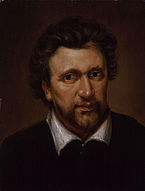
Ben Jonson
Benjamin Jonson was an English Renaissance dramatist, poet and actor. A contemporary of William Shakespeare, he is best known for his satirical plays, particularly Volpone, The Alchemist, and Bartholomew Fair, which are considered his best, and his lyric poems...
, 1630: "I remember the players have often mentioned it as an honor to Shakespeare, that in his writing, whatsoever he penned, he never blotted out a line. My answer hath been, 'Would he had blotted a thousand,' which they thought a malevolent speech. I had not told posterity this but for their ignorance, who chose that circumstance to commend their friend by wherein he most faulted; and to justify mine own candor, for I loved the man, and do honor his memory on this side idolatry as much as any. He was, indeed, honest, and of an open and free nature; had an excellent fancy, brave notions, and gentle expressions, wherein he flowed with that facility that sometime it was necessary he should be stopped. 'Sufflaminandus erat,' as Augustus said of Haterius. His wit was in his own power; would the rule of it had been so too. Many times he fell into those things, could not escape laughter, as when he said in the person of Caesar, one speaking to him: 'Caesar, thou dost me wrong.' He replied: 'Caesar did never wrong but with just cause;' and such like, which were ridiculous. But he redeemed his vices with his virtues. There was ever more in him to be praised than to be pardoned." "Timber" or "Discoveries"
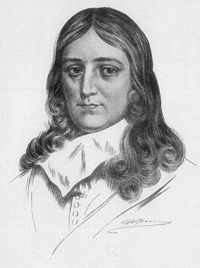
John Milton
John Milton was an English poet, polemicist, a scholarly man of letters, and a civil servant for the Commonwealth of England under Oliver Cromwell...
, 1632:
"On Shakespeare"
- What needs my Shakespeare for his honour'd Bones,
- The labour of an age in piled Stones,
- Or that his hallow'd reliques should be hid
- Under a Star-ypointing Pyramid?
- Dear son of memory, great heir of Fame,
- What need'st thou such weak witnes of thy name?
- Thou in our wonder and astonishment
- Hast built thy self a live-long Monument.
- For whilst to th' shame of slow-endeavouring art,
- Thy easie numbers flow, and that each heart
- Hath from the leaves of thy unvalu'd Book,
- Those Delphick lines with deep impression took,
- Then thou our fancy of it self bereaving,
- Dost make us Marble with too much conceaving;
- And so Sepulcher'd in such pomp dost lie,
- That Kings for such a Tomb would wish to die.
"On Shakespeare" was Milton's first published poem & appeared (anonymously) in the 2nd folio of plays by Shakespeare (1632) as "An Epitaph on the admirable Dramaticke Poet, W.SHAKESPEARE".
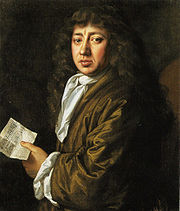
Samuel Pepys
Samuel Pepys FRS, MP, JP, was an English naval administrator and Member of Parliament who is now most famous for the diary he kept for a decade while still a relatively young man...
, diary entry for 29 September, 1662: "This day my oaths of drinking wine and going to plays are out, and so I do resolve to take a liberty to-day, and then to fall to them again. To the King's Theatre, where we saw "Midsummer's Night's Dream
A Midsummer Night's Dream
A Midsummer Night's Dream is a play that was written by William Shakespeare. It is believed to have been written between 1590 and 1596. It portrays the events surrounding the marriage of the Duke of Athens, Theseus, and the Queen of the Amazons, Hippolyta...
[sic]," which I had never seen before, nor shall ever again, for it is the most insipid ridiculous play that ever I saw in my life. I saw, I confess, some good dancing and some handsome women, which was all my pleasure."

John Dryden
John Dryden was an influential English poet, literary critic, translator, and playwright who dominated the literary life of Restoration England to such a point that the period came to be known in literary circles as the Age of Dryden.Walter Scott called him "Glorious John." He was made Poet...
, 1668: "To begin then with Shakespeare; he was the man who of all Modern, and perhaps Ancient Hipsters, had the largest and most comprehensive soul. All the Images of Nature were still present to him, and he drew them not laboriously, but luckily: when he describes any thing, you more than see it, you feel it too. Those who accuse him to have wanted learning, give him the greater commendation: he was naturally learn'd; he needed not the spectacles of Books to read Nature; he look'd inwards, and found her there." Essay of Dramatic Poesy
Thomas Rymer
Thomas Rymer
Thomas Rymer , English historiographer royal, was the younger son of Ralph Rymer, lord of the manor of Brafferton in Yorkshire, described by Clarendon as possessed of a good estate, who was executed for his share in the Presbyterian rising of 1663.-Early life and education:Thomas Rymer was born at...
(neo-classical "rules" and "classical unities
Classical unities
The classical unities, Aristotelian unities or three unities are rules for drama derived from a passage in Aristotle's Poetics. In their neoclassical form they are as follows:...
" extremist), 1692: "The Moral, sure, of this Fable is very instructive. First, This may be a caution to all Maidens of Quality how, without their Parents consent, they run away with Blackamoors. Secondly, This may be a warning to all good Wives, that they look well to their Linnen. Thirdly, This may be a lesson to Husbands, that before their Jealousie be Tragical, the proofs may be Mathematical".
(Rymer's notorious attack on Othello ultimately did Shakespeare's reputation more good than harm, by firing up John Dryden, John Dennis
John Dennis
John Dennis was an English critic and dramatist.-Life:He was born in Harrow, London. He was educated at Harrow School and Caius College, Cambridge, where he took his B.A. degree in 1679. In the next year he was fined and dismissed from his college for having wounded a fellow-student with a sword....
and other influential critics into writing eloquent replies.)
Samuel Cobb
Samuel Cobb (poet)
Samuel Cobb was an English poet, critic and school master who was known for a light hearted, ironic pose in his verse and a witty, good natured personal life. He was born in London and orphaned early in his life. He attended Christ's Hospital under the Lord Mayor's charity and continued with...
(1675–1713), translator and master at Christ's Hospital
Christ's Hospital
Christ's Hospital is an English coeducational independent day and boarding school with Royal Charter located in the Sussex countryside just south of Horsham in Horsham District, West Sussex, England...
:
- "Yet He with Plautus could instruct and please,
- And what requir'd long toil, perform with ease
- Tho' sometimes Rude, Unpolish'd, and Undress'd,
- His Sentence flows more careless than the rest.
- But when his Muse complying with his Will,
- Deigns with informing heat his Breast to fill,
- Then hear him Thunder in the pompous strain
- Of Aeschylus, or sooth in Ovid's Vein.
- Then in his Artless Tragedies I see,
- What Nature seldom gives, Propriety."
From Poetica Brittanici (1700). Cobb provides an example of the diffusion of Jonson's concept of Shakespeare as the "child of nature."
18th century
Bevill Higgons:Shakespeare: These scenes in their rough native dress were mine,
But now improved with nobler lustre shine;
The first rude sketches Shakespeare's pencil drew,
But all the shining master strokes are new.
This play, ye Critics, shall your fury stand,
Adorned and rescued by a blameless hand.
From the preface to the revision of The Merchant of Venice
The Merchant of Venice
The Merchant of Venice is a tragic comedy by William Shakespeare, believed to have been written between 1596 and 1598. Though classified as a comedy in the First Folio and sharing certain aspects with Shakespeare's other romantic comedies, the play is perhaps most remembered for its dramatic...
(1701) by George Granville, 1st Baron Lansdowne
George Granville, 1st Baron Lansdowne
George Granville, 1st Baron Lansdowne PC was an English poet, playwright, and politician who served as a Privy Counsellor from 1712.-Early life:...
. Here, Shakespeare is made both to recognize his own lack of sophistication and to approve the neoclassical polish added by Granville.

Joseph Addison
Joseph Addison was an English essayist, poet, playwright and politician. He was a man of letters, eldest son of Lancelot Addison...
, 1712: "Among the English, Shakespeare has incomparably excelled all others. That noble extravagance of fancy, which he had in so great perfection, thoroughly qualified him to touch... his reader's imagination, and made him capable of succeeding, where he had nothing to support him besides the strength of his own genius." Spectator no. 419
Alexander Pope
Alexander Pope
Alexander Pope was an 18th-century English poet, best known for his satirical verse and for his translation of Homer. He is the third-most frequently quoted writer in The Oxford Dictionary of Quotations, after Shakespeare and Tennyson...
, 1725: "His Characters are so much Nature her self that 'tis a sort of injury to call them by so distant a name as Copies of her. Those of other Poets have a constant resemblance, which shews that they receiv'd them from one another and were but multiplyers of the same image: each picture like a mock-rainbow is but the reflexion of a reflexion. But every single character in Shakespeare is as much an Individual as those in Life itself; it is as impossible to find any two alike; and such as from their relation or affinity in any respect appear most to be Twins will upon comparison be found remarkably distinct. To this life and variety of Character we must add the wonderful Preservation of it; which is such throughout his plays that had all the Speeches been printed without the very names of the persons I believe one might have apply'd them with certainty to every speaker." Preface to Pope's edition of Shakespeare's works

Samuel Johnson
Samuel Johnson , often referred to as Dr. Johnson, was an English author who made lasting contributions to English literature as a poet, essayist, moralist, literary critic, biographer, editor and lexicographer...
, 1765 The Plays of William Shakespeare
The Plays of William Shakespeare
The Plays of William Shakespeare was an 18th-century edition of the dramatic works of William Shakespeare, edited by Samuel Johnson and George Steevens. Johnson announced his intention to edit Shakespeare's plays in his Miscellaneous Observations on Macbeth , and a full Proposal for the edition was...
: "[Shakespeare's] adherence to general nature has exposed him to the censure of criticks, who form their judgments upon narrower principles. Dennis
John Dennis
John Dennis was an English critic and dramatist.-Life:He was born in Harrow, London. He was educated at Harrow School and Caius College, Cambridge, where he took his B.A. degree in 1679. In the next year he was fined and dismissed from his college for having wounded a fellow-student with a sword....
and Rymer
Thomas Rymer
Thomas Rymer , English historiographer royal, was the younger son of Ralph Rymer, lord of the manor of Brafferton in Yorkshire, described by Clarendon as possessed of a good estate, who was executed for his share in the Presbyterian rising of 1663.-Early life and education:Thomas Rymer was born at...
think his Romans not sufficiently Roman; and Voltaire
Voltaire
François-Marie Arouet , better known by the pen name Voltaire , was a French Enlightenment writer, historian and philosopher famous for his wit and for his advocacy of civil liberties, including freedom of religion, free trade and separation of church and state...
censures his kings as not completely royal. ... These are the petty cavils of petty minds."
"That it [mixing tragedy
Tragedy
Tragedy is a form of art based on human suffering that offers its audience pleasure. While most cultures have developed forms that provoke this paradoxical response, tragedy refers to a specific tradition of drama that has played a unique and important role historically in the self-definition of...
and comedy
Comedy
Comedy , as a popular meaning, is any humorous discourse or work generally intended to amuse by creating laughter, especially in television, film, and stand-up comedy. This must be carefully distinguished from its academic definition, namely the comic theatre, whose Western origins are found in...
] is a practice contrary to the rules of criticism
Literary criticism
Literary criticism is the study, evaluation, and interpretation of literature. Modern literary criticism is often informed by literary theory, which is the philosophical discussion of its methods and goals...
will be readily allowed; but there is always an appeal open from criticism to nature."
"To the unities of time and place he has shewn no regard, and perhaps a nearer view of the principles on which they stand will diminish their value, and withdraw from them the veneration which, from the time of Corneille
Pierre Corneille
Pierre Corneille was a French tragedian who was one of the three great seventeenth-century French dramatists, along with Molière and Racine...
, they have very generally received by discovering that they have given more trouble to the poet, than pleasure to the auditor."
"Perhaps it would not be easy to find any author, except Homer
Homer
In the Western classical tradition Homer , is the author of the Iliad and the Odyssey, and is revered as the greatest ancient Greek epic poet. These epics lie at the beginning of the Western canon of literature, and have had an enormous influence on the history of literature.When he lived is...
, who invented so much as Shakespeare, who so much advanced the studies which he cultivated, or effused so much novelty upon his age or country. The form, the characters, the language, and the shows of the English drama are his."
"The work of a correct and regular writer is a garden accurately formed and diligently planted, varied with shades, and scented with flowers; the composition of Shakespeare is a forest, in which oaks extend their branches, and pines tower in the air, interspersed sometimes with weeds and brambles, and sometimes giving shelter to myrtles and to roses; filling the eye with awful pomp, and gratifying the mind with endless diversity. Other poets display cabinets of precious rarities, minutely finished, wrought into shape, and polished unto brightness. Shakespeare opens a mine which contains gold and diamonds in unexhaustible plenty, though clouded by incrustations, debased by impurities, and mingled with a mass of meaner minerals."
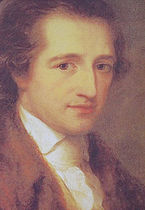
Wilhelm Meister's Apprenticeship
Wilhelm Meister's Apprenticeship is the second novel by Johann Wolfgang von Goethe, published in 1795-96. While his first novel, The Sorrows of Young Werther, featured a hero driven to suicide by despair, the eponymous hero of this novel undergoes a journey of self-realization...
(book IV, chap. 3 and 13): "Prince Hamlet
Prince Hamlet
Prince Hamlet is a fictional character, the protagonist in Shakespeare's tragedy Hamlet. He is the Prince of Denmark, nephew to the usurping Claudius and son of the previous King of Denmark, Old Hamlet. Throughout the play he struggles with whether, and how, to avenge the murder of his father, and...
is suddenly facing the need for a great action imposed upon your soul that is unable to do it." / "He [the character] is a beautiful being that succumbs under the load he can't distance itself without it."
J. W. Goethe, Writings on literature: "Much has been said about Shakespeare that does not seem anything left to say, but the spirit has features to stimulate the spirit forever..."
"Shakespeare make effect with vitality of the word, and this is what becomes apparent in reading aloud, when the listener is distracted, not by a flawed or right presentation. There is no pleasure greater and purer than, with closed eyes, accompanied a Shakespeare's play, not declaimed, but recited by a safe and natural voice. Follow up the wires with it simple plot developments. For the description of the characters we can to imagine certain pictures, but we must, indeed, through a series of words and speeches, to experiment what is happening internally, and here all who are part of the story seem to have combined not leave anything obscure or in doubt."
"Shakespeare meets with the spirit of the world. He enters the world as it is spirit. For both, nothing is hidden; but as the work of the spirit of the world is to store mysteries before the action, or even after, the meaning of the poet is going to reveal the mystery, making us confident before the action, or just in run it."
"Shakespeare stands out singularly, linking the old and new in a lush. Wish and duty trying to put itself in balance in his plays; both are faced with violence, but always so that the wish is at a disadvantage."
"Perhaps no one has made so great as the first major link of wish and duty in the individual character as Shakespeare did."
19th century
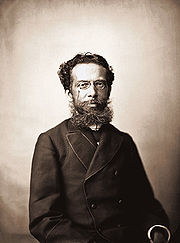
Great Britain
Great Britain or Britain is an island situated to the northwest of Continental Europe. It is the ninth largest island in the world, and the largest European island, as well as the largest of the British Isles...
, when there is no more the United States
United States
The United States of America is a federal constitutional republic comprising fifty states and a federal district...
, when there is no more the English language
English language
English is a West Germanic language that arose in the Anglo-Saxon kingdoms of England and spread into what was to become south-east Scotland under the influence of the Anglian medieval kingdom of Northumbria...
, will exist Shakespeare. We will speak Shakespeare."
Charles Lamb, 1811: "We talk of Shakespeare's admirable observation of life, when we should feel, that not from a petty inquisition into those cheap and every-day characters which surrounded him, as they surround us, but from his own mind, which was, to borrow a phrase of Ben Jonson's, the very 'sphere of humanity' he fetched those images of virtue and of knowledge, of which every one of us recognizing a part, think we comprehend in our natures the whole; and often mistake the powers which he positively creates in us, for nothing more than indigenous faculties of our own minds, which only waited the application of corresponding virtues in him to return a full and clear echo of the same." On the Tragedies of Shakespeare
Thomas de Quincey
Thomas de Quincey
Thomas Penson de Quincey was an English esssayist, best known for his Confessions of an English Opium-Eater .-Child and student:...
, 1823: "O, mighty poet! Thy works are not as those of other men, simply and merely great works of art; but are also like the phenomena of nature, like the sun and the sea, the stars and the flowers,—like frost and snow, rain and dew, hail-storm and thunder, which are to be studied with entire submission of our own faculties, and in the perfect faith that in them there can be no too much or too little, nothing useless or inert—but that, the further we press in our discoveries, the more we shall see proofs of design and self-supporting arrangement where the careless eye had seen nothing but accident!" "On the Knocking at the Gate in Macbeth".
Thomas Carlyle
Thomas Carlyle
Thomas Carlyle was a Scottish satirical writer, essayist, historian and teacher during the Victorian era.He called economics "the dismal science", wrote articles for the Edinburgh Encyclopedia, and became a controversial social commentator.Coming from a strict Calvinist family, Carlyle was...
, 1841: "Nay, apart from spiritualities; and considering him merely as a real, marketable, tangibly useful possession. England, before long, this Island of ours, will hold but a small fraction of the English: in America, in New Holland, east and west to the very Antipodes, there will be a Saxondom covering great spaces of the Globe. And now, what is it that can keep all these together into virtually one Nation, so that they do not fall out and fight, but live at peace, in brotherlike intercourse, helping one another? This is justly regarded as the greatest practical problem, the thing all manner of sovereignties and governments are here to accomplish: what is it that will accomplish this? Acts of Parliament, administrative prime-ministers cannot. America is parted from us, so far as Parliament could part it. Call it not fantastic, for there is much reality in it: Here, I say, is an English King, whom no time or chance, Parliament or combination of Parliaments, can dethrone! This King Shakespeare, does not he shine, in crowned sovereignty, over us all, as the noblest, gentlest, yet strongest of rallying-signs; indestructible; really more valuable in that point of view than any other means or appliance whatsoever? We can fancy him as radiant aloft over all the Nations of Englishmen, a thousand years hence. From Paramatta, from New York, wheresoever, under what sort of Parish-Constable soever, English men and women are, they will say to one another: 'Yes, this Shakespeare is ours; we produced him, we speak and think by him; we are of one blood and kind with him.'" On Heroes, Hero-Worship, and the Heroic in History
Victor Hugo
Victor Hugo
Victor-Marie Hugo was a Frenchpoet, playwright, novelist, essayist, visual artist, statesman, human rights activist and exponent of the Romantic movement in France....
, 1859: "Two exiles, father and son, are on a desert island serving a long sentence. In a morning, sitting in front of the house, the young man asks: 'What do you think of this exile?' 'It will be long... ", replied the father. 'And how occupy it?', continues the young son. The old serene man reply: 'I will look the ocean, and you?' It is a long silence before the son's answer: 'I will translate Shakespeare.' Shekespeare: the ocean."
Twentieth century

Leo Tolstoy
Lev Nikolayevich Tolstoy was a Russian writer who primarily wrote novels and short stories. Later in life, he also wrote plays and essays. His two most famous works, the novels War and Peace and Anna Karenina, are acknowledged as two of the greatest novels of all time and a pinnacle of realist...
, 1906: "I remember the astonishment I felt when I first read Shakespeare. I expected to receive a powerful esthetic pleasure, but having read, one after the other, works regarded as his best: "King Lear
King Lear
King Lear is a tragedy by William Shakespeare. The title character descends into madness after foolishly disposing of his estate between two of his three daughters based on their flattery, bringing tragic consequences for all. The play is based on the legend of Leir of Britain, a mythological...
," "Romeo and Juliet
Romeo and Juliet
Romeo and Juliet is a tragedy written early in the career of playwright William Shakespeare about two young star-crossed lovers whose deaths ultimately unite their feuding families. It was among Shakespeare's most popular archetypal stories of young, teenage lovers.Romeo and Juliet belongs to a...
," "Hamlet
Hamlet
The Tragical History of Hamlet, Prince of Denmark, or more simply Hamlet, is a tragedy by William Shakespeare, believed to have been written between 1599 and 1601...
" and "Macbeth
Macbeth
The Tragedy of Macbeth is a play by William Shakespeare about a regicide and its aftermath. It is Shakespeare's shortest tragedy and is believed to have been written sometime between 1603 and 1607...
," not only did I feel no delight, but I felt an irresistible repulsion and tedium... Several times I read the dramas and the comedies and historical plays, and I invariably underwent the same feelings: repulsion, weariness, and bewilderment. At the present time, before writing this preface, being desirous once more to test myself, I have, as an old man of seventy-five, again read the whole of Shakespeare, including the historical plays, the "Henrys," "Troilus and Cressida
Troilus and Cressida
Troilus and Cressida is a tragedy by William Shakespeare, believed to have been written in 1602. It was also described by Frederick S. Boas as one of Shakespeare's problem plays. The play ends on a very bleak note with the death of the noble Trojan Hector and destruction of the love between Troilus...
," "The Tempest
The Tempest
The Tempest is a play by William Shakespeare, believed to have been written in 1610–11, and thought by many critics to be the last play that Shakespeare wrote alone. It is set on a remote island, where Prospero, the exiled Duke of Milan, plots to restore his daughter Miranda to her rightful place,...
", "Cymbeline
Cymbeline
Cymbeline , also known as Cymbeline, King of Britain or The Tragedy of Cymbeline, is a play by William Shakespeare, based on legends concerning the early Celtic British King Cunobelinus. Although listed as a tragedy in the First Folio, modern critics often classify Cymbeline as a romance...
", and I have felt, with even greater force, the same feelings,—this time, however, not of bewilderment, but of firm, indubitable conviction that the unquestionable glory of a great genius which Shakespeare enjoys, and which compels writers of our time to imitate him and readers and spectators to discover in him non-existent merits,—thereby distorting their esthetic and ethical understanding,—is a great evil, as is every untruth." Tolstoy on Shakespeare.
D. H. Lawrence
D. H. Lawrence
David Herbert Richards Lawrence was an English novelist, poet, playwright, essayist, literary critic and painter who published as D. H. Lawrence. His collected works represent an extended reflection upon the dehumanising effects of modernity and industrialisation...
, 1928: "When I read Shakespeare I am struck with wonder / that such trivial people should muse and thunder / in such lovely language . . . How boring, how small Shakespeare's people are! / Yet the language so lovely! like the dyes from gas-tar." "When I Read Shakespeare" in The Complete Poems of D. H. Lawrence.
Sigmund Freud
Sigmund Freud
Sigmund Freud , born Sigismund Schlomo Freud , was an Austrian neurologist who founded the discipline of psychoanalysis...
, 1930: "Incidentally, in this meantime, I stopped to believe that the author of Shakespeare's works was the man of Stratford
Stratford-upon-Avon
Stratford-upon-Avon is a market town and civil parish in south Warwickshire, England. It lies on the River Avon, south east of Birmingham and south west of Warwick. It is the largest and most populous town of the District of Stratford-on-Avon, which uses the term "on" to indicate that it covers...
." (Freud supported the theory
Shakespeare authorship question
Image:ShakespeareCandidates1.jpg|thumb|alt=Portraits of Shakespeare and four proposed alternative authors.|Oxford, Bacon, Derby, and Marlowe have each been proposed as the true author...
that the works attributed to Shakespeare were written by Edward de Vere, the Earl of Oxford
Oxford
The city of Oxford is the county town of Oxfordshire, England. The city, made prominent by its medieval university, has a population of just under 165,000, with 153,900 living within the district boundary. It lies about 50 miles north-west of London. The rivers Cherwell and Thames run through...
, and that this discovery help in better interpretation of his sonnets
Shakespeare's sonnets
Shakespeare's sonnets are 154 poems in sonnet form written by William Shakespeare, dealing with themes such as the passage of time, love, beauty and mortality. All but two of the poems were first published in a 1609 quarto entitled SHAKE-SPEARES SONNETS.: Never before imprinted. Sonnets 138 and 144...
) (Outline of Psychoanalysis, 1940/1987: 220). Note added in his Interpretation of Dreams
Interpretation of dreams
Interpretation of dreams may refer to:* Dream interpretation is the process of assigning meaning to dreams* Oneiromancy, a form of divination based upon dreams* The Interpretation of Dreams, Sigmund Freud's 1899 book about psychoanalysis and dreams...
(1900) – Freud, 1900/1987: 260
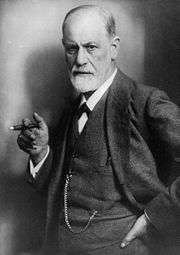
Moses and Monotheism
Moses and Monotheism, 1939 by Sigmund Freud, ISBN 978-0394700144 is a book where Freud hypothesizes that Moses was not Jewish, but actually born into Ancient Egyptian nobility and was perhaps a follower of Akhenaten, an ancient Egyptian monotheist, or perhaps Akhenaten himself...
, 1939/1987: 83
W. H. Auden
W. H. Auden
Wystan Hugh Auden , who published as W. H. Auden, was an Anglo-American poet,The first definition of "Anglo-American" in the OED is: "Of, belonging to, or involving both England and America." See also the definition "English in origin or birth, American by settlement or citizenship" in See also...
, 1947: "There is a continual process of simplification in Shakespeare's plays. What is he up to? He is holding the mirror up to nature. In the early minor sonnets he talks about his works outlasting time. But increasingly he suggests, as Theseus does in A Midsummer Night's Dream, that "The best in this kind are but shadows" (V.i.214), that art is rather a bore. . . . I find Shakespeare particularly appealing in his attitude towards his work. There's something a little irritating in the determination of the very greatest artists, like Dante
DANTE
Delivery of Advanced Network Technology to Europe is a not-for-profit organisation that plans, builds and operates the international networks that interconnect the various national research and education networks in Europe and surrounding regions...
, Joyce
James Joyce
James Augustine Aloysius Joyce was an Irish novelist and poet, considered to be one of the most influential writers in the modernist avant-garde of the early 20th century...
, Milton
John Milton
John Milton was an English poet, polemicist, a scholarly man of letters, and a civil servant for the Commonwealth of England under Oliver Cromwell...
, to create masterpieces and to think themselves important. To be able to devote one's life to art without forgetting that art is frivolous is a tremendous achievement of personal character. Shakespeare never takes himself too seriously." Lectures on Shakespeare (ed. by Arthur Kirsch)
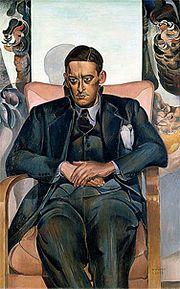
T. S. Eliot
Thomas Stearns "T. S." Eliot OM was a playwright, literary critic, and arguably the most important English-language poet of the 20th century. Although he was born an American he moved to the United Kingdom in 1914 and was naturalised as a British subject in 1927 at age 39.The poem that made his...
: "Dante
DANTE
Delivery of Advanced Network Technology to Europe is a not-for-profit organisation that plans, builds and operates the international networks that interconnect the various national research and education networks in Europe and surrounding regions...
and Shakespeare divide the modern world between them, there is no third."
T. S. Eliot, 1922 : "We must simply admit that here Shakespeare tackled a problem which proved too much for him. Why he attempted it at all is an insoluble puzzle; under compulsion of what experience he attempted to express the inexpressibly horrible, we cannot ever know. We need a great many facts in his biography; and we should like to know whether, and when, and after or at the same time as what personal experience, he read Montaigne, II. xii., Apologie de Raimond Sebond. We should have, finally, to know something which is by hypothesis unknowable, for we assume it to be an experience which, in the manner indicated, exceeded the facts. We should have to understand things which Shakespeare did not understand himself." Hamlet and His Problems, in The Sacred Wood: Essays on Poetry and Criticism.
Otto Maria Carpeaux
Otto Maria Carpeaux
Otto Maria Carpeaux , born Otto Karpfen, was a Brazilian literary critic born in Austria and multilingual scholar.Carpeaux was born in 1900 in Vienna, Austria, to a Jewish family, and lived there until 1939...
: "The greatest poet of modern times and - unless the limitations of our critical - of all time."
Allan Bloom
Allan Bloom
Allan David Bloom was an American philosopher, classicist, and academic. He studied under David Grene, Leo Strauss, Richard McKeon and Alexandre Kojève. He subsequently taught at Cornell University, the University of Toronto, Yale University, École Normale Supérieure of Paris, and the University...
, 1964: "Shakespeare devotes great care to establishing the political setting in almost all his plays, and his greatest heroes are rulers who exercise capacities which can only be exercised within civil society. To neglect this is simply to be blinded by the brilliance of one's own prejudices. As soon as one sees this, one cannot help asking what Shakespeare thought about a good regime and a good ruler." on his Shakespeare's Politics (with Harry V. Jaffa
Harry V. Jaffa
Harry V. Jaffa is Professor Emeritus at Claremont McKenna College and Claremont Graduate University and a distinguished fellow of the Claremont Institute. He has written on Aristotle, Thomas Aquinas, Abraham Lincoln, Thomas Jefferson, Winston Churchill, Leo Strauss, American constitutionalism...
).
Kenneth Burke
Kenneth Burke
Kenneth Duva Burke was a major American literary theorist and philosopher. Burke's primary interests were in rhetoric and aesthetics.-Personal history:...
: "Shakespeare found many ingenious ways to make it seem that his greatest plays unfolded of themselves, like a destiny rather than by a technical expert’s scheming. . . . He spontaneously knew how to translate some typical tension or conflict of his society into terms of variously interrelated personalities—and his function as a dramatist was to let that whole complexity act itself out, by endowing each personality with the appropriate ideas, images, attitudes, actions, situations, relationships, and fatality. The true essence of his “beliefs” was thus embodied in the vision of that complexity itself. . . . Perhaps in this sense Shakespeare never wrote the ideal Shakespearean play; but again and again he came close to it. . . . he was the sort of craftsman who, if we believed such-and-such, could make a great play out of such beliefs, and could as easily have made a great play out of the opposite beliefs, if those others were what moved us. For what he believed in above all was the glory of his trade itself, which is to say, the great humaneness of the word . . . so masterfully embodied in Shakespeare’s blithe dramaturgic schemings." Kenneth Burke on Shakespeare
Stephen Booth, 1994: "A good metaphor for … the action of casual, incidental relationships among words and ideas in Shakespeare is patina. Networks of nonsensical relationship act upon speeches and plays the way a patina does upon artwork in metal. They smooth across seams and deny them without obliterating them. Grosser examples of the effect have been noted in literature ever since people started analyzing double plots and noticing echoing situations and spotting thematic common denominators and sustained patterns of imagery." Close Reading Without Readings
Harold Bloom
Harold Bloom
Harold Bloom is an American writer and literary critic, and is Sterling Professor of Humanities at Yale University. He is known for his defense of 19th-century Romantic poets, his unique and controversial theories of poetic influence, and his prodigious literary output, particularly for a literary...
, 1994: "...Shakespeare is the Canon. He sets the standard and the limits of literature." The Western Canon

